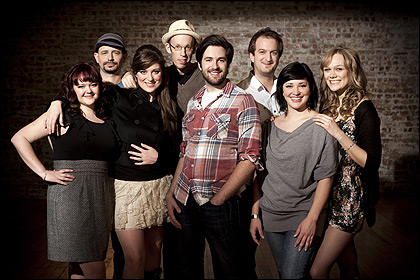
Swingle to Swing
A jazz and classical music smorgasbord
By Brett Campbell
Way back in Mad Men-era Paris, a group of crack Paris session singers — vocalists hired to provide background sounds for stars like Edith Piaf, Michel Legrand and Charles Aznavour — warmed up their sight-reading skills by singing through that perennial source of musical exercises, J.S. Bach’s Well Tempered Clavier. Originally written for keyboard as a sort of demonstration of tuning possibilities, the pieces turned out to sound pretty swinging when parlayed by eight skilled singers. They made a recording with rhythm section for friends and family; it caught the ear of radio programmers and then listeners. Soon they had a number one record, 1963’s Jazz Sebastian Bach, arrangements of Beatles, classical tunes and more.
 |
Those of us too young to recall the glory days of the Swingle Singers might hear the seemingly silly name and think of them as some kind of lightweight, easy listening ensemble but in fact, American-born founder Ward Swingle’s group was respected enough to earn collaborations with the Modern Jazz Quartet, formidable composers such as modernist Luciano Berio, minimalist Michael Nyman and microtonalist Ben Johnston. After the original French octet disbanded in 1973, Swingle started a successor group in London and they’ve been going ever since, collaborating with contemporary stars such as Jamie Cullum and covering everyone from Bjork to Piazzolla. On April 16, the Swingles join our own Eugene Concert Choir and Eugene Vocal Arts Ensemble, plus instrumentalists including Barbara Baird, for two performances of a program called Bach to Beatbox. They’ll sing music from popular contemporary choral composer Eric Whitacre, Chick Corea, Chopin, Gershwin, Falla and more, including Bach, of course.
This Thursday at the Hult Center, the Eugene Symphony makes a commendable and welcome foray into contemporary music by bringing the music of one of today’s most respected composers, John Harbison, to Eugene. The orchestra will perform hisFlute ConcertoandThe Most Often Used Chords, along with Tchaikovsky’s Symphony #1. The 1987 Pulitzer Prizewinner has written a vast amount of admired chamber music, operas (including The Great Gatsby), several symphonies, choral works, vocal works and more.
The Oregon Bach Collegium plays music by Bach’s oldest son Wilhelm Friedemann and other seldom heard Baroque 18th century music, April 16 at United Lutheran Church. It’s a nice opportunity to hear lovely period instruments like oboe d’amore and Baroque violas. Then on Sunday afternoon, April 17, at Episcopal Church of the Resurrection, and Friday evening, April 22, at First Christian Church, you can hear one of the most popular of all Baroque masterpieces, Giovanni Battista Pergolesi’s magnificent Stabat Mater — which he finished shortly before dying way too young (age 26) in 1736.
Classical music of a different but no less beautiful tradition — North Indian Hindustani music — is on stage April 15, when the school’s estimable world music series BRING’s the great sitar virtuoso Kartik Seshadri (perhaps Ravi Shankar’s most renowned disciple) and tablawallah Arup Chattopadhyay to the University of Oregon’s Beall Concert Hall. They’ll also do a free lecture demo that afternoon at the UO’s Jordan Schnizter Museum.
Finally, the UO honors one of America’s greatest musical figures, composer/pianist/bandleader Duke Ellington, at Beall on April 20. Two of the school’s jazz ensembles will be joined by faculty jazz masters Idit Shner, Steve Owen, Mike Denny, Carl Woideck and more in some of the master’s greatest hits, including “Prelude to a Kiss,” “Come Sunday,” and even more ambitious works, like Such Sweet Thunder.